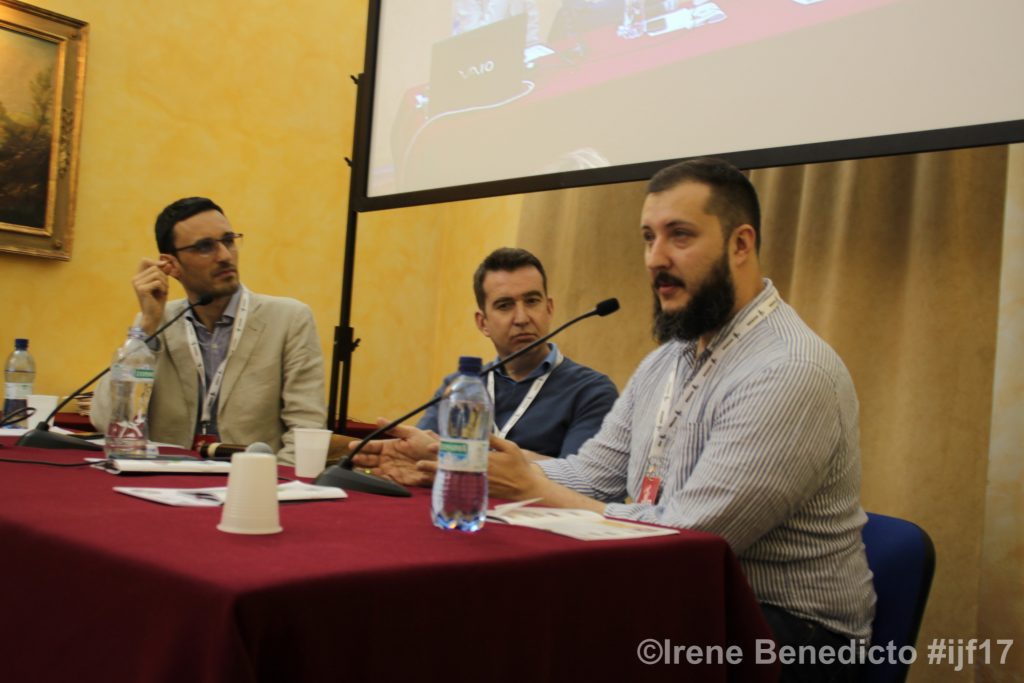All the new entrepreneurs are in search of the magic recipe that could make their startup a successful and sustainable business. Adriano Farano, Mark Little and Josh Young, by narrating the stories of their startups, shared with the audience some secrets that could help those who seek to build their own media startup achieve success.
Observing life and realizing that there is an opportunity for someone to fix the already existing mess used to be food for thought and creativity at this panel discussion. Throughout several examples they analyzed the steps that someone should follow in order to create a startup, while they emphasized the vital role of trust between the audience and journalists.
The starting point: Motivation
Motivation is the key element to start something new, the panellists agreed.
The extremely fast dimension that Twitter had been taking eight years ago made Young (CEO of Pack Technologies) both curious and worried about its final impacts: he thought it was important to organise the chaos that existed and to bring some quality to this social media platform. His idea was a real success for a couple of years and indeed he achieved to bring a change, to one of the most used social media platforms.
Little’s experience as a correspondent in Iran was to become his personal turning point: at one time, he was unable to personally attend a scene in an area affected by the war and had to read the news from Twitter. Little – former Twitter Vice President of Media for Europe and Africa, and went on to fund Storyful – noted that the way the news was spreading all over the world was impressive, but also dangerous.
All these immense amounts of information so easily available, of which only half were verified, encouraged him to run a startup that could provide accurate information sources in the ever-expanding social media sphere.
Farano, Head of Content at Plex, had a quite similar experience too. From a very young age, he had the tendency to share the news with his classmates and extrapolating the facts from complex information to simple stories. As time went on, his passion developed and took the decision to create the platform Watchup, the first streaming service designed entirely for news watching.
The journey: From dream to reality
Little pointed out the difficulties and the challenges that someone could face at the beginning of setting up a media startup. He mentioned that one of the important parts is to adjust your culture to the different needs of the users. He also referred to the possible threats and risks that may arise during the building of the startup, and the extreme importance of product choice and its sustainability, especially in the area of media.
Young’s startup media journey was different from those of his colleagues. Like many others, in a short period of time he succeeded in establishing his own business and was soon able to attract many users. The paradox and simultaneously interesting part of his story is that the majority of his platform’s users were producers. At that point, he began to discover and take under consideration their own specific needs in order to make his startup sustainable. He insisted that the traction for the consumer is essential in order to succeed.
Farano talked about how, in this new sector, someone has to gain the experience as they work on establishing a startup company. He also talked to the audience about the possible concerns that may come up, with emphasis on wrong assumptions. “We glorify the ideas a lot more than they should be,” he said “the important thing is to be realistic.”
Fundraising and investments
All three speakers pointed our that finding investors is not actually the hardest part, and that framing one’s idea in the right way is the main focus: while it doesn not necessarily need to be very concrete, proposals should prove their future sustainability.
“Choose your investors the way they would choose you and simultaneously confront your biggest fear and interpret it,” Farano added to address the importance of risk assessment, highlighting the significance of hiring experts, like lawyers and someone in charge of managing the technical side of the venture. The speakers admitted that rejection and disappointment are possible in the early days of a new project, but that should not lead to giving up. Tenacity, flexibility and knowing where you want to go are the triptych of success.
The audience reacted to the conversation by directly questioning the panel in regards to how media startups can stand out among other media companies, asking tips on possible methods to avoid risks and some addressed the role of journalists as businessmen. The panellists responded by focusing on the importance of building trust between journalists and the users, fixing mistakes and taking under consideration the risk of failure.
They concluded the discussion by reinforcing the idea that the goal of journalists is that to deliver accurate news to the public and that they should thus be considered as leaders instead of businessmen.
